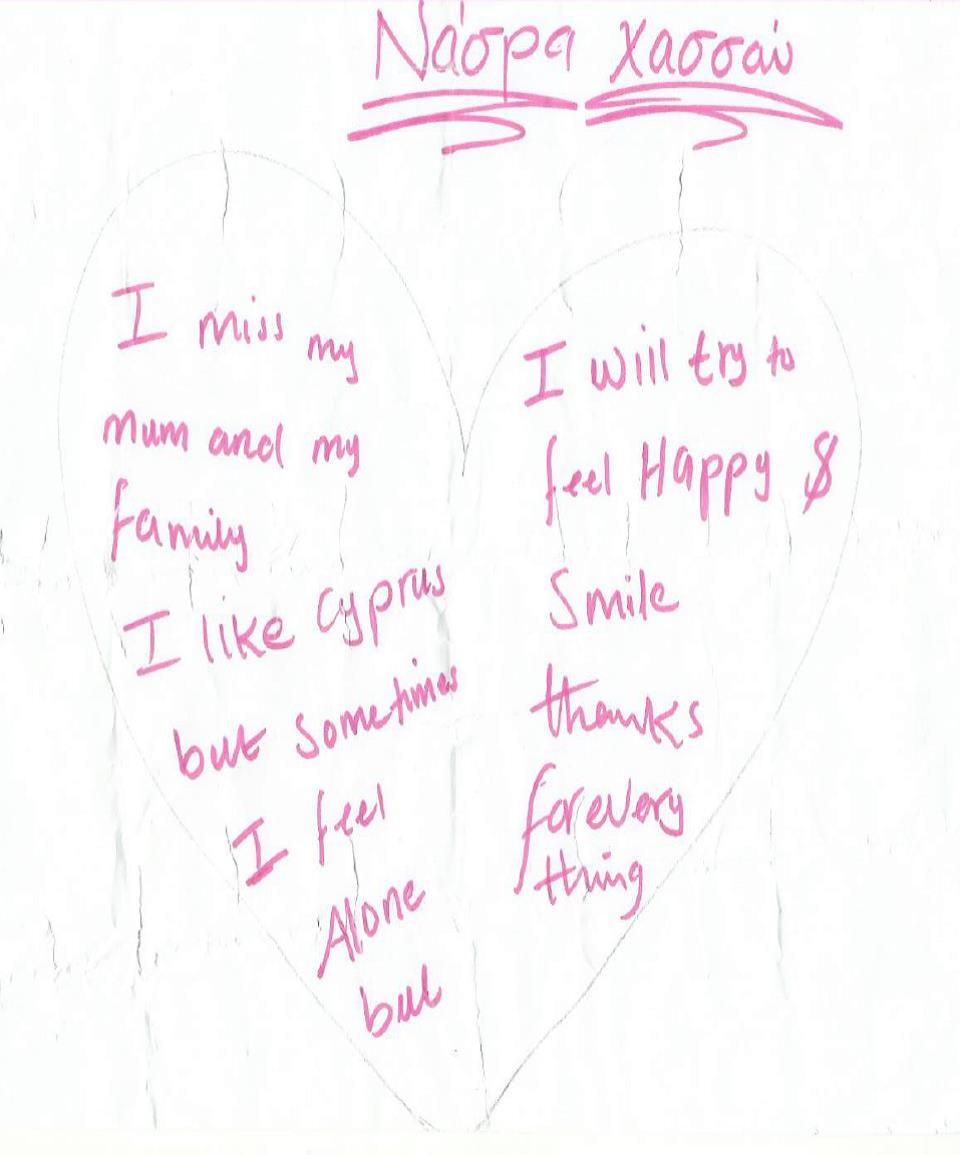Renowned international Recording Artist, Alexia Vassiliou, works with unaccompanied and separated asylum-seeking children in Cyprus, in a series of creative experiential workshops, supported by UNHCR.

A refugee girl writes about her feelings in a heart-shape, during one of the Re-bE workshops conducted by Alexia Vassiliou
Inspire – Connect – Belong was the three-fold aim of a series of creative experiential workshops, supported by UNHCR, and conducted by the renowned international Recording Artist, Alexia Vassiliou, to benefit a group of unaccompanied and separated asylum-seeking children, in Cyprus.
Attended by 25 girls from Somalia and Cameroon who came to Cyprus alone to seek asylum from war and persecution, the workshops were based on Alexia’s innovative educational program, “Re-bE The Music Listening Method – Music Movement”, specifically designed to address the needs of each child, their traumatic experiences and help restore a sense of safety and hope for a brighter future.
The girls aged 13-17, are placed at a shelter, under the guardianship of the state welfare services until they turn 18. Some are waiting to join family members in other EU countries; others are waiting for a decision by the Cypriot authorities on their asylum applications. Few have already turned 18 and others will soon come of age and will be asked to leave the shelter, unprepared to face the challenges that entails, adding additional emotional distress which may prevent them from their growth, evolution and integration.
While the girls attend school during their time at the shelter, they lack extracurricular activities which can help them connect with themselves and with their new environment.
“To Re-bE means, to return to our authentic state, which is a state of continuous joy, via music listening and creative expression. Re-bE is not a lesson, but rather a way of life. Its aim is to cultivate through Music, Art, Movement, Mentorship, and the Environment and educates on ecological sustainability,” Alexia, a refugee herself from Famagusta, Cyprus, explains.
“In the case of the separated and unaccompanied children, “Re-bE” is designed to creatively distract them from their trauma and current situation, through music and creativity, in order to connect, inspire, empower them, and free their creative expression. To help secure a safe environment for the children to express, to identify what they like and to foster their skills, to influence and inspire them… to prepare them through education, culture and cultivation so that they are able to create for themselves a life of quality and lasting joy.”
Watch highlights from the workshops here.
Through the workshops, the children were exposed to music listening, creative storytelling via improvisation, movement/dance, rhythm through playing percussion and using their voices to express, and the arts, including ceramics and using their hands to create. In addition to bringing the community to the children, the children went into the community, visiting museums, attending a concert and school music shows, taking them into the environment around them, and bringing the girls in contact with inspirational, educated and powerful women of the Cypriot community, proved to be a significant life-changing experience for the participants. “Such multi-dimensional educational programmes, as “Re-bE”, are important for refugee children who have lost not only their homes and families but also access to education, skills, confidence, social circles, aspirations and dreams. Social, re-creational projects, such as Re-bE help in diffusing frustration, insecurity and loneliness that most of the children feel and can therefore help in restoring their futures…” says Damtew Dessalegne, UNHCR Representative in Cyprus.

Two refugee girls attend one of the Re-bE workshops conducted by Alexia Vassiliou at the shelter ©2017.Alexia Vassiliou. Re-bE the Music Listening Method‐Music Movement.
During the more than 20 workshops, the participants came to realize that there’s life outside the youth shelter and explored their surroundings. Most importantly, many of the girls came to identify their interests, skills and dreams. Becoming a human rights lawyer, teachers, artists, musicians, and doctors were some of the interests expressed in the process.
“…we particularly loved the drums session, the musical school performance, the ceramic arts session…” some of the girls said and expressed their gratitude to Alexia for the quality time she spent with them.
“We loved all the sessions, they were really interesting. We learned a lot of things, met interesting people, discovered new places and artists,” others said calling for more workshops.
The workshops have concluded, but the girls continue to connect with Alexia.
But Re-bE is only part of the empowerment equation. There’s still a long way to go.
“Now, it is up to all of us to help the girls fulfill and accomplish their interests and aspirations,”
Alexia rightly points out.
“Re-bE workshops are one aspect of helping the children secure something substantial; however, the work to fully prepare them for their current situation and where their journey may take them needs to be more comprehensive and orchestrated in a well thought of and structured plan of action, both within the shelter and when they are released into the society…”
Indeed, the protection and care of refugee children separated from their families requires a holistic approach geared at nurturing their potential and supporting them as they restart their lives, by providing skill development, education, psychosocial support, family reunification and recreational programmes.
In Cyprus, there are at present just over 100 unaccompanied and separated asylum-seeking children, aged 15-17, residing in four shelters. In the absence of family-based care options, ensuring and maintaining access of these children and those living with their parents or guardians, to quality mainstream education, with additional State support for their swift integration into the school environment, and their transition into society, remains at the top of UNHCR’s priorities.
Μοιράσου το στο Facebook Μοιράσου το στο Twitter